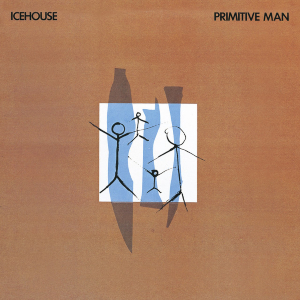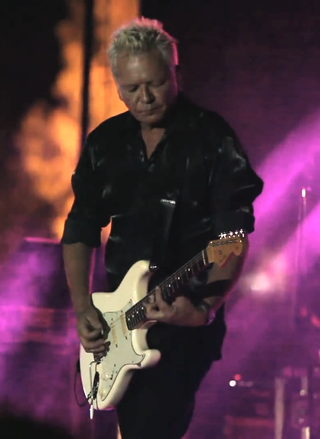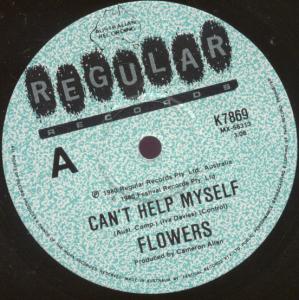
Icehouse are an Australian rock band, formed in Sydney in 1977 as Flowers. Initially known in their homeland for their pub rock style, the band later achieved mainstream success playing new wave and synth-pop music and attained Top 10 singles chart success locally and in both Europe and the U.S. The mainstay of both Flowers and Icehouse has been Iva Davies supplying additional musicians as required. The name "Icehouse", adopted in 1981, comes from an old, cold flat Davies lived in and the strange building across the road populated by itinerant people.

"Tiny Dancer" is a song written by English musician and composer Elton John and lyricist Bernie Taupin, and performed by John. It was originally released on John's 1971 album Madman Across the Water as its opening track, and was later produced and released as a single in 1972.

Primitive Man, the second studio album by Australian rock band Icehouse, was released on 20 September 1982. In January 1982, Icehouse founder Iva Davies started recording Primitive Man essentially as a solo project. It was co-produced with Keith Forsey, who later worked with Simple Minds and Billy Idol. Forsey supplied additional percussion; Davies supplied vocals, lead guitar, keyboards, bass guitar and programmed the Linn drum machine. Released as an Icehouse album, Primitive Man reached number 3 on the National album charts and provided their international breakthrough single, "Hey Little Girl", which peaked at number 7 in Australia, number 2 in Switzerland, number 5 in Germany, the top 20 in UK, Sweden and Netherlands, and number 31 on the US Billboard Mainstream Rock chart. Another single "Great Southern Land" made the Australian top 5; it was later featured in the 1988 Yahoo Serious film Young Einstein, and remains their most popular song according to listeners of Triple M in 2007. To promote Primitive Man on tour, Davies re-assembled Icehouse with Michael Hoste (keyboards) and John Lloyd (drums), and new members: Bob Kretschmer, Guy Pratt and Andy Qunta.

"Rio" is the seventh single by English rock band Duran Duran. It was first released as a single in Australia, in August 1982, followed by a UK release on 1 November 1982.

"The Wild Boys" is the twelfth single by the English pop rock band Duran Duran, released on 22 October 1984 in the United Kingdom.

"Electric Blue" is a song by Australian rock band Icehouse. It was co-written by Iva Davies of Icehouse and John Oates of US band Hall & Oates. Oates became involved with Davies after contacting him to state he was a fan. The resulting collaboration produced this song and Oates has stated that if Davies had not released the song under the Icehouse name, then it would have been a Hall & Oates track.

Ivor Arthur Davies, AM, known professionally as Iva Davies, is an Australian singer, songwriter, composer, multi-instrumentalist and record producer.

"Great Southern Land" is a song by Australian rock band Icehouse. It was released on 9 August 1982 as the lead single from their second studio album Primitive Man. It peaked at No. 5 on the Australian Singles Chart, it was later featured in the 1988 Yahoo Serious film Young Einstein, and remains their most popular songs according to listeners of Triple M in 2007.

"I Guess That's Why They Call It the Blues" is a song by English musician Elton John, with music by John and Davey Johnstone and lyrics by Bernie Taupin, released as the first single from John's 17th studio album Too Low for Zero. It was the first single since 1975's "Someone Saved My Life Tonight" to feature the classic lineup of the Elton John Band.

Sidewalk is the third studio album by Australian rock band Icehouse, released on 26 June 1984 by Chrysalis Records and Regular Records. It peaked at No. 8 on the National albums chart. Founding member Iva Davies used the Fairlight CMI digital sampling synthesizer on this more sombre and reflective album. This is the first studio album that bassist Guy Pratt worked on as a member of the band. Pratt would later become a session musician, and go on to work with artists such as Pink Floyd, Roxy Music, David Bowie, Madonna and Michael Jackson.

Measure for Measure is the fourth studio album by the Australian rock band Icehouse, released in April 1986 in Australia by Regular Records and in the United States by Chrysalis Records. It was one of the first three albums to be recorded entirely digitally.

"Hey Little Girl" is a single released by Australian band Icehouse, the second single from the band's 1982 album, Primitive Man. The album and single were co-produced by band member and the track's writer, Iva Davies, and Keith Forsey. It was released in November 1982 on Regular Records in 7" vinyl single and 12" vinyl single formats. UK and Europe releases by Chrysalis Records were also on 7" and 12" formats, but with different track listings. The single was then released in the US in 1983 on the same formats. On "Hey Little Girl", Iva Davies uses the Linn drum machine—the first for an Australian recording. It peaked at No. 7 on the Australian singles chart and No. 2 in Switzerland, No. 5 in Germany, Top 20 in UK, Sweden and Netherlands, and No. 31 on the Billboard Mainstream Rock chart.

"I'm Still Standing" is a song written by English musician Elton John and songwriter Bernie Taupin, from John's 1983 studio album Too Low for Zero. It was the lead single from the album in North America, but released as the second single in the UK.
The discography of Icehouse, an Australian rock and synthpop band, includes releases under the earlier band name, Flowers, which was formed in 1977 by the mainstay Iva Davies, and was renamed Icehouse in 1981; material was also released by "Iva Davies and Icehouse". Flowers or Icehouse have released seven studio albums, one soundtrack album, as well as four remix albums and forty-one singles.

"No Promises" is a song by Australian band Icehouse, released in October 1985, as the first single issued from the band's 1986 album, Measure for Measure. The single was released in Australia through Regular Records, on 7", 12" and maxi-cassette single formats. Chrysalis Records issued the single in the UK and Europe on 7" and 12" formats, with different track listings. "No Promises" was subsequently released in the US by Chrysalis on 7" and 12" formats, again with different track listings. The single peaked at #30 on the Australian singles chart in February 1986. A remixed version by (Love) Tattoo was included on the Icehouse remix album Meltdown in 2002. Two music videos were filmed to promote the single; the second of these was directed by Dieter Trattmann.

"Can't Help Myself" is the first single released by the Australian synthpop/rock band Flowers, later known as Icehouse. It was released in May 1980 as a 7" vinyl single on independent label, Regular Records, five months ahead of debut album Icehouse. A 10" vinyl single was released in July and had a cover depicting individual images of band members diagonally across the band's name and the single's title. It peaked at #10 on the Australian Singles Charts.

"Icehouse" is a song by the Australian rock band Flowers, later known as Icehouse. It was released as a single in Europe in 1982 by Chrysalis Records from the band's first album, Icehouse, after the band changed its name to Icehouse. In the United States, the song peaked at number 28 on the Billboard Top Tracks chart in 1981.
Russell Mulcahy is an Australian director of film, television, and music videos. He began his career directing music videos for artists like Elton John and Duran Duran, before making his feature directorial debut with the horror film Razorback (1984). He achieved international prominence by directing the fantasy action film Highlander (1986), which spawned a multimedia franchise.

"Crazy" is a song by the Australian rock/synthpop band Icehouse, from the Man of Colours album, the single peaked at Number 4 on the Australian Kent Music Report. The song was written by band members Iva Davies, Robert Kretschmer and Andy Qunta, and produced by David Lord.

"Muscle Bound" is a song by the English new wave band Spandau Ballet, released as part of the third single from their debut album Journeys to Glory. In the UK, it was released as a double A-side with the song "Glow"; elsewhere, "Glow" was included as the B-side. "Muscle Bound" received mostly good reviews, and the combined single was their third consecutive top 20 hit in their native UK, reaching number 10 on the UK Singles Chart. The music video for "Muscle Bound" was more ambitious than their previous promotional clips and went over budget because of snowy weather that caused delays during the location shoot.


















